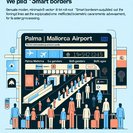
Spain’s busiest Mediterranean cargo port has taken dramatic action that reverberates through the country’s short-sea passenger market. On 12 November the Port Authority of València (APV) voted to revoke the 35-year concession it had granted in 2021 to Puerto Natura Valencia SL, a subsidiary of Baleària, for the construction and operation of a dedicated passenger-ferry terminal on the northern breakwater of the port’s inner basin. APV president Mar Chao told reporters that the decision reflects “substantial changes in vessel manoeuvrability requirements, traffic patterns and inter-port connectivity” since the project was first conceived.
Baleària’s project—budgeted at €37 million—envisaged a carbon-neutral terminal handling up to 370 metre ferries on regular routes linking València with Palma, Ibiza, Mostaganem (Algeria) and Nador (Morocco). Construction was due to start this quarter, but environmental permitting, design alterations and the arrival of larger LNG-fuelled vessels pushed the timeline back by at least 18 months. According to APV officials, that delay provided an opportunity to rethink berth allocations across the entire northern dock.
![Valenciaport revokes Baleària’s passenger-terminal concession, reshaping ferry links to mainland Spain]()
In parallel, container traffic has rebounded faster than pre-pandemic levels, and two major ro-ro operators—Grimaldi and MSC’s GNV—have requested additional ramp space for 220-metre ships that cannot be accommodated in current layouts. APV now wants to integrate passenger and ro-ro traffic into a single, flexible complex rather than dedicate an exclusive zone to one operator.
The revocation does not necessarily exclude Baleària from Valenciaport. Chao confirmed that the ferry line may bid again when a re-tender is published in early 2026, “but under new technical criteria and with a footprint that optimises shared use.” Until then, Baleària will continue to use the existing terminal on the Turia dock, where it handled 1.9 million passengers in 2024.
For mobility managers the change is more than local politics: València–Balearics is Spain’s second-busiest inter-island corridor for freight-accompanied vans and project cargo. Companies moving staff and equipment between mainland Spain and the islands should expect berth reshuffles, revised schedules and possible capacity constraints next summer while the port redesigns its pier assignments. Advance bookings for high-season corporate relocations and critical freight are strongly advised.
Baleària’s project—budgeted at €37 million—envisaged a carbon-neutral terminal handling up to 370 metre ferries on regular routes linking València with Palma, Ibiza, Mostaganem (Algeria) and Nador (Morocco). Construction was due to start this quarter, but environmental permitting, design alterations and the arrival of larger LNG-fuelled vessels pushed the timeline back by at least 18 months. According to APV officials, that delay provided an opportunity to rethink berth allocations across the entire northern dock.

In parallel, container traffic has rebounded faster than pre-pandemic levels, and two major ro-ro operators—Grimaldi and MSC’s GNV—have requested additional ramp space for 220-metre ships that cannot be accommodated in current layouts. APV now wants to integrate passenger and ro-ro traffic into a single, flexible complex rather than dedicate an exclusive zone to one operator.
The revocation does not necessarily exclude Baleària from Valenciaport. Chao confirmed that the ferry line may bid again when a re-tender is published in early 2026, “but under new technical criteria and with a footprint that optimises shared use.” Until then, Baleària will continue to use the existing terminal on the Turia dock, where it handled 1.9 million passengers in 2024.
For mobility managers the change is more than local politics: València–Balearics is Spain’s second-busiest inter-island corridor for freight-accompanied vans and project cargo. Companies moving staff and equipment between mainland Spain and the islands should expect berth reshuffles, revised schedules and possible capacity constraints next summer while the port redesigns its pier assignments. Advance bookings for high-season corporate relocations and critical freight are strongly advised.








